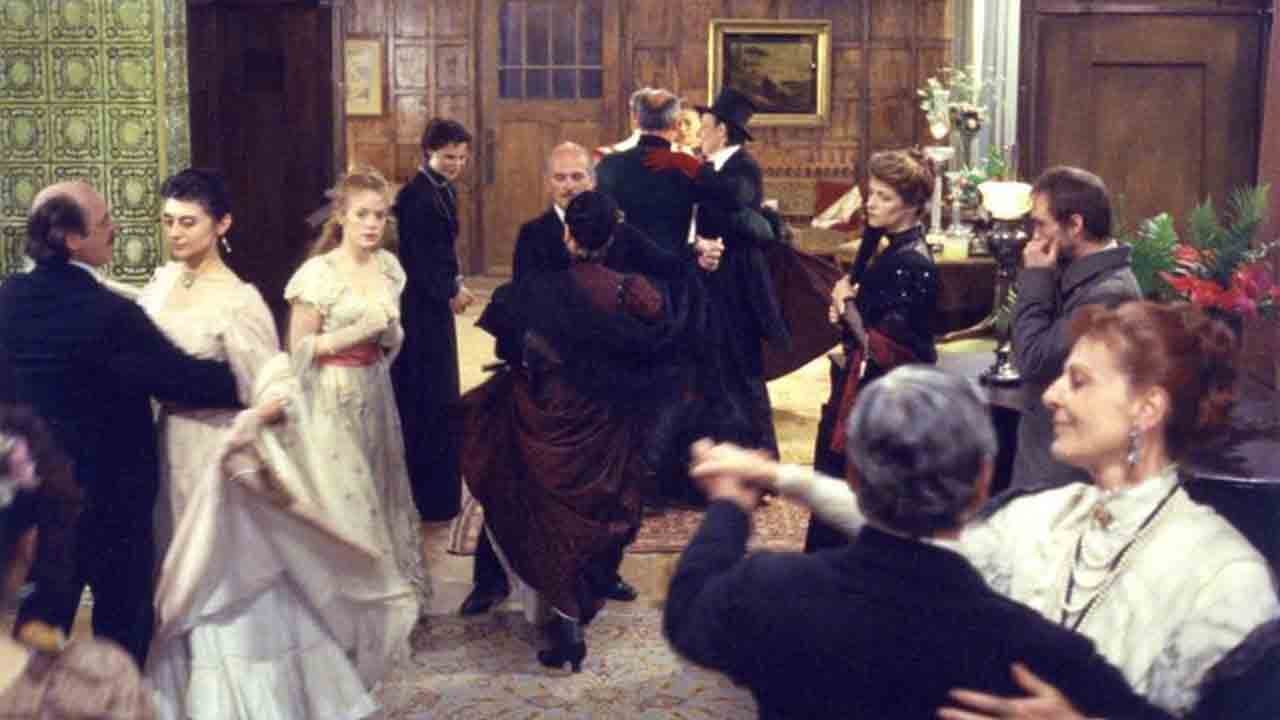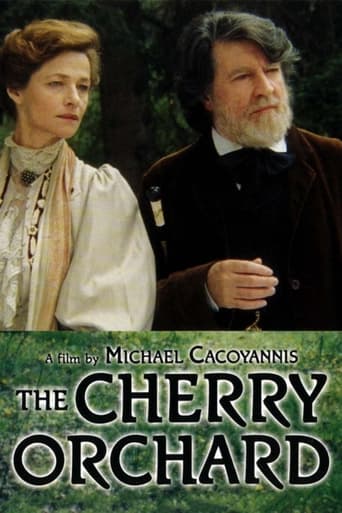

The Cherry Orchard is Mihalis Kakogiannis' ambitious, if ultimately dissatisfying, film adaptation of Chekhov's famous play of the same name. In an attempt to remain true to the story's roots as a stage performance, Kakagiannis filmed the movie as if he were filming a live performance. While this approach is undeniably an artistically appealing gamble, we quickly find that the over the top acting and hasty scene transitions (perfectly befitting a stage) ultimately fail to translate smoothly onto the big screen. The film struggles to grab your attention early on (when it is most critical to engage the audience and establish a connection), but does come into its own about halfway through.Following the Russian abolition of serfdom in the mid-19th century, many noble families found themselves strapped for cash as they lacked the resources and skills required to maintain the estates previously granted to them and maintained by free labor. Set in this era, The Cherry Orchard introduces us to one of these financially struggling noble families on the brink of losing their beloved estate, known for its beautiful cherry orchard. Despite receiving sound advice on how to save the bulk of their estate (at the cost of the orchard itself), the family continuously brushes all logic aside as if waiting to be saved from their fate without having to give up anything in return or to lift a finger to help themselves. Because of this, the estate is seized and put up for auction, ultimately falling into the hands of an up-and-coming merchant whose family had been serfs at the estate for generations prior to abolition. This highlights both the waning power of noble society and the rising fortunes of the middle class in Russia at the turn of the century. Because the family would do nothing to save themselves, the film ends with them going their separate ways into the world as the sounds of axes echo in the background. The Cherry Orchard is being cut down, symbolizing the transition from the old world into the new. As the family leaves and the estate is boarded up, we the longtime family servant, who had served as a serf before the abolition and stayed loyal to the family, has been forgotten and locked inside to die. Earlier in the story, this servant had referred to the abolition of serfdom as a great misfortune, symbolizing that this is man who had long ago resigned himself to his fate. Here again, the man simply sits down without a fight, resigned to his misfortune. His fate, like that of the entire family, is left unknown.Overall, the movie was entertaining at times and utterly boring at others. Its approach was ambitious but, sadly, missed the mark. The actors themselves performed admirably, but even their skill could do little to distract from how badly stage acting so often translates to film acting and vice versa. The two arts are separate for a reason, and very rarely is their melding done correctly. The story itself was thought-provoking and entertaining, a testament to Chekhov's abilities, and once you've grown accustomed the style of the film it becomes infinitely more watchable. For fans of Russian history, it offers an interesting glimpse into Russian society at the turn of the century. For fans of Chekhov, it provides you with a glimpse of what his play would look like if performed and if you're unable to go see it live, as it should be seen. For fans of film...meh.
... View MoreMichael Cacoyannis seems strangely reluctant to tell this story in a straightforward, understandable fashion. This ridiculously edited film rates a 7 out of 10 only because it does, in its idiosyncratic way, convey something of the story of a Russian woman, of the landed gentry, fallen on hard times, who is desperately seeking to preserve the ownership of her estate, on which is an ancient and beloved cherry orchard. If she is forced to sell, the orchard will be cut down and the estate "developed" into "affordable housing". So what else is new, eh?By all, this is the choppiest editing and directing style I have ever encountered. Chekhov's play is certainly not constructed this way. There is no effort to introduce characters in an orderly fashion so that one may get to know who they are, and what their relationships and motivations are. Some of this eventually emerges if you are patient and alert enough, but don't blink! Some of the cast work is excellent. They must have been frustrated, though, if they knew what kind of editing would appear in the final cut.
... View MoreChekhov's plays have generally resisted film and TV adaptations: Sidney Lumet's "Sea Gull" was lumpy and not well cast, and even the Russian film adaptations have been turgid affairs.Michael Cacoyannis' version of "The Cherry Orchard" (originally titled "Varya" after one of the main characters), is better than Lumet's film largely because it's better acted in general. But the direction is sometimes fussy, sometimes leaden - the pacing becomes more and more turgid as the film progresses. The final 40 minutes or so become very tedious. Plus there's an unnecessary prologue in Paris - an obvious attempt to open up the play, but it goes on much too long.Charlotte Rampling does very well as Madame Ranyevskaya, a near-penniless aristocrat who returns to her family estate as it is about to be auctioned after a default on the mortgage. Rampling clearly shows us a aging woman who is spoiled, charming, childish, delusional, sometimes haughty and condescending, and feckless - a person who never learned how to manage money because she never felt she had to. Her performance makes this woman less conventionally sympathetic than others in the role - which is fine. There are times when her performance is undercut by some jarring editing where her mood swings from one extreme to another.The rest of the cast is quite fine: Alan Bates as Ranyevskaya's equally feckless and lazy brother Gayev shows us the man who knows full well his coming fate, yet goes through fits of denial to coddle his sister and the others; Michael Gough as the increasingly senile family servant Fiers; Tushka Bergen as Ranyevskaya's daughter Anya.The best acting comes from Katrin Cartlidge as the hapless, lovesick, foster daughter Varya, a soul sister to Sonia of Uncle Vanya; and Owen Teale (who was superb with Janet McTeer onstage in "A Doll's House") as Lopahin, a former peasant whose family worked on Ranyevskaya's farm but who has now become a successful businessman. His efforts to convince the fading aristocrats to save themselves by selling the estate fall on deaf ears, so he decides on a different plan of action.I would recommend seeing this only to people who are familiar with the play. First-timers would be better off seeking out a good stage production (lots of luck there) as Chekhov has always worked better there.
... View MoreCacoyannis began his career filming Greek tragedies five decades ago. Anyone seeing his production of Chekhov's wonderful play knows he adores this work: the discerning casting, the use of Tchaikovsky's little-known piano pieces. Best of all is the look of the production-- its costuming and lighting have the quality of delicate homage. Watch for scenes like the arrival of auction-bidders in a muddy street midway through the film-- a bit of period recreation on a par with Coppola and Scorsese. Chekhov's brilliant bits of stage-business are treasured here: Varya's clobbering her wished-for fiance with a door-slam, Epikhodov's goofs, Yasha's mother-problem, and especially the family's sitting gravely down together before their dispersal. These are lovingly done, and if citing them here is meaningless to those who haven't read the play, I'm afraid the film will mean as little to them, especially on videotape, where the exquisite visuals won't count for much. The acting can't sustain novices-- the cast, especially the males, show the effects of limited rehearsal time, sliding in and out of cohesion. The exceptions to that are Katrin Cartlidge (in a role that often stands-out in stage productions), Ian McNeice, and Michael Gough, delivering the finest performance I have seen from his 50+ years of movie-acting-- acting-teachers should march students to see CHERRY ORCHARD to hear how Gough reads a choice line like, "Now I can die." Cacoyannis nodded in spots: the weird accents affected by the lower-class characters add nothing, and the hammy Act II beggar-- one wants to thrash him. This is not a great film. But the play it serves may be the past century's greatest. At a time when American theaters cannot afford large-cast period plays, a Chekhov-fan feels special gratitude for this production.
... View More